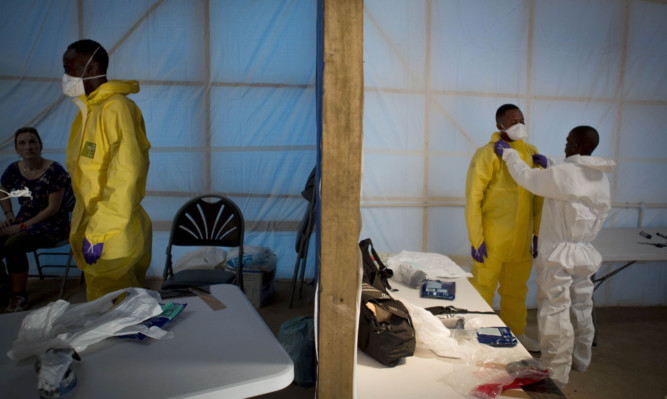
Stark warning from British aid worker over virus threat.
A British aid worker at the heart of the fight against Ebola has warned there are just 50 days to avert a global catastrophe.
Glasgow-born Rob MacGillivray has been with Save The Children for 15 years and his assessment of the current crisis in Africa is stark.
Rob warns: “Either we win or Ebola wins that’s it. There’s no halfway house. The critical window is between now and the end of the year. The World Health Organisation has been looking at scenarios projecting 10,000 infections a week. If that happens, then the battle is lost.”
Rob, 55, has been on the ground at humanitarian crises in Rwanda, Zaire, the Democratic Republic of Congo, Sudan, Eritrea, Uganda, Kenya and more.
He’s now Save The Children’s country director in Sierra Leone. It’s the nation second most badly affected by the Ebola crisis in West Africa, and he is coordinating the fight in other hard-hit countries in the region too.
The charity is rapidly scaling up its response in Liberia and Guinea.
There have been more than 3,700 confirmed cases in Sierra Leone alone and the disease has so far claimed more than 1,000 lives there. That death toll is rising fast.
Rob has seen untold death and suffering in some of the world’s most stricken countries, but says Ebola is “an emergency in a category all of its own, the worst in many ways”.
“There is a tension and fear in people all the time and what sets it apart is that it’s a hidden enemy. It’s different from other places I’ve been in that there are no peace talks and no possibility of surrender as you would have in a conflict.
“All you have is success or failure.”
This week, Rob has overseen the opening of Save The Children’s first specialist Ebola Treatment Centre in Sierra Leone.
Situated in Kerry Town, about 25 miles from the capital Freetown, it has 100 beds and 200 frontline medical staff backed by more than 100 other workers.
It’s a vital new facility in the bid to get on top of the outbreak which has swamped local medics and escalated alarmingly.
Testing by Personal Protective Equipment-wearing medics will confirm whether someone has the disease with confirmed cases being treated in isolation units.
“Once in, there are two ways out,” says Rob. “The first is that the person recovers. The other unfortunately is through the mortuary.”
A UN aid worker died in Sierra Leone late last month, highlighting the risk all those trying to make a difference face.
The new centre houses a separate clinic run by the UK Ministry of Defence to deal with any health workers stricken by the virus.
As wife Liz waits at home in Ardrossan, Rob has a rigid daily routine to stay safe.
“You just have to take precautions and no one can let their guard down.
“I have to have my temperature taken five or six times a day and I wash my hands at least 20 times a day in a chlorine solution.”
One of the first patients through the doors of the ETC this week was an 11-year-old girl, already very seriously ill.
Rob knows only too well the recovery prospects for the young life are 50/50 at best.
As the desperate race to develop an effective, widely available vaccine goes on, getting the message about prevention across is critical.
“We’re vaccinating people with information,” said Rob.
“Don’t eat bats, don’t eat chimpanzees, monkeys, porcupine or antelope and don’t eat half-eaten berries on the ground.
“And 60 to 70% of infections come as a result of traditional burial practices, swabbing the body down. Because that’s something women tend to do, there’s a disproportionate number of women, as well as children, affected.
“We’re trying to get these messages across and also, if there is a problem, to get along to a treatment centre as soon as possible.”
SINCE the DEC Ebola Crisis Appeal was launched last week, £17 million has been raised across the UK. And more than £1.5m of the donations have come from Scotland.
David Miller, Chair of the DEC Ebola Crisis Appeal in Scotland, said: “The response of the people of Scotland and throughout the UK has been incredible.
“Our member agencies have done a great deal to help stop the spread of the virus and support those caught up in the crisis, however, there is still much more to do.”
Donations can be made at www.dec.org.uk or by calling 0370 60 60 900.Related:The deadly knock-on effect of Ebola

Enjoy the convenience of having The Sunday Post delivered as a digital ePaper straight to your smartphone, tablet or computer.
Subscribe for only £5.49 a month and enjoy all the benefits of the printed paper as a digital replica.
Subscribe